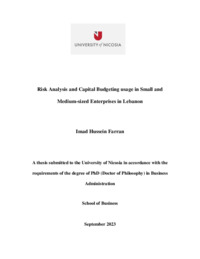- Farran, Imad
- Department of Management
- 12 December 2023
- English
- 270 p.
- El Haj, Mohammad | Spuric, Svetlana | Kaufmann, Hans-Ruediger
- Capital Budgeting Techniques | Capital Budgeting Practices | Lebanese SME's | Sensitivity Analysis
- Lebanon -- Small and Medium-Sized Enterprises
-
-
Lebanon, akin to many other regions, has undergone modest economic development and technological progress, with the prevalence of small-scale enterprises shaping the nation's economic landscape. The private sector, notably propelled by small and medium-sized enterprises (SMEs), has consistently held a pivotal role in the country's growth trajectory. Consequently, the SME sector assumes a vital role in Lebanon's long-term advancement, especially given the significant financial activities occurring within the informal sector. This thesis delves into the capital budgeting practices embraced by SMEs in Lebanon, offering valuable insights into the broader national context. The primary aim is to discern the principal capital budgeting techniques employed by SMEs and their effectiveness in mitigating financial risks. Moreover, the research endeavors to achieve a deeper comprehension of the economic and societal conditions that govern the operations of SMEs and the informal sector in Lebanon. By doing so, this thesis strives to furnish a comprehensive exploration of the capital budgeting practices adopted by Lebanese SMEs, revealing their role in the management of financial risks within the wider national framework. Employing a mixed-method research design, this study seamlessly integrates qualitative and quantitative data collection and analysis methodologies. This approach facilitates a holistic understanding of the research question or issue, harnessing the power of multiple methods to investigate the matter at hand. One aspect of this thesis focuses on unraveling the unique conditions prevailing in Lebanon. Notably, the thesis presents research findings concerning the impact of the COVID-19 pandemic on employees and businesses in Lebanon. Overall, the study concludes that while most SMEs engage in certain financial planning practices, they do not uniformly implement all financial planning activities. iii These findings carry significant relevance within the current economic climate, where SMEs grapple with pronounced challenges due to the pandemic's repercussions and broader economic fluctuations. By adeptly selecting suitable Investment Appraisal Techniques during pivotal investment decisions, SMEs can forecast, strategize, and fortify themselves against liquidity constraints and potential insolvency, particularly in times of economic downturn. Hence, this research stands poised to offer valuable guidance to SMEs in Lebanon, aiding them in navigating their business operations during these formidable times.
-
Risk Analysis and Capital Budgeting usage in Small and Medium-sized Enterprises in Lebanon
Main Files
| Type | Location | Link |
|---|---|---|
| dissertation | [More information] |


